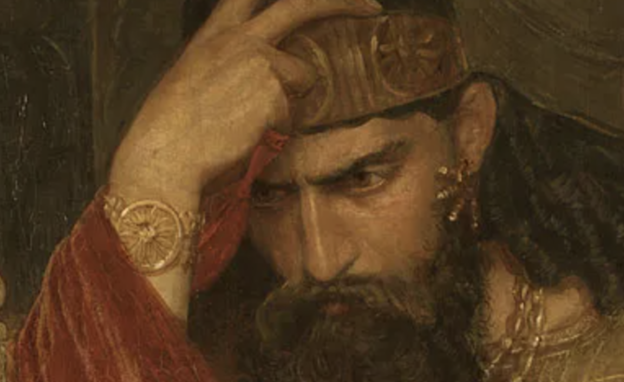The Bible likes to offer contrasts as a way of teaching us about following God. Jesus told the parable of the wise and foolish men and their building locations. The Disciples are contrasted in the Gospels with their Spirit-filled boldness in Acts. The wise man and the fool are frequently contrasted in the Proverbs.
1 Samuel 14 shows us a contrast, this time between father and son. Saul foolishly offered sacrifices that were not his to offer, and lost his kingdom. Saul, abandoned by Samuel, associated with priests abandoned by God. Jonathan’s son meanwhile stepped out in faith to strike a blow against the Philistines. His example reminds us that God is able to accomplish the impossible.
When Saul offered the sacrifice which only a priest should offer, he lost God’s favour. The end of chapter 13 left Saul and Jonathan largely alone, surrounded, with only a small number of troops. Meanwhile, the Philistine horde were tightening their grip on the uppity Israelites who had dared to attack them. Of their army, only Saul and his son Jonathan had proper military equipment.
Not surprisingly, Saul cut a sad and foolish figure. By contrast, Jonathan was energetic. Taking his armour bearer into his confidence, he suggested attacking the Philistine garrison. Perhaps sensing Saul’s inaction and hesitance, the author tells us he did not inform his father (v.1). Better to beg forgiveness than ask permission.
Jonathan is ready to strike a blow against the enemy. Saul is sitting in a cave (or under a tree, the Hebrew is unclear), moping about and wondering what to do (v.2). Besides his six hundred soldiers, he had gathered to himself Ahijah, who was the nephew of Ichabod (the glory has departed), son of Phinehas, son of Eli (v.3). A rejected king, hanging around with rejected priests.
Finally, a little topography. Saul’s camp and the Philistine camp were on hills separated by a ravine, on crags named Bozez (slippery) and Seneh (thorny; vv.4-5). Not exactly the best choice of attack route. Most sane people would not bother.
But out of the impossible, God achieves wonders. Jonathan faithfully expressed to his armour bearer “Come, let us go over to the garrison of these uncircumcised. It may be that the Lord will work for us, for nothing can hinder the Lord from saving by many or by few” (v.6). There is faith! God can do wonders, he may do wonders through us, but he can’t work wonders unless we are there for him to use.
His faithful armour bearer beside (v.7), Jonathan showed himself to the Philistines and took their taunting as an invitation to attack, trusting that if God was on their side he would put the right words in the Philistine mouths (vv.8-12).
Sure enough, Jonathan and companion climbed the impassable route and attacked the Philistines before they knew what had hit (v.13). All of a sudden there were twenty dead, and the rest of the garrison in a panic sent by God (vv.14-15).
Meanwhile back at Saul’s HQ, the rout was noticed (v.16). After counting heads, they realised Jonathan and his armour bearer were gone (v.17). Yet there was no action, only foolish inaction. Saul calls for the Ark of the Covenant to come, so some ritual could be performed to reveal the way (v.18). When no answer came, Saul put a stop to the rituals (v.19). Apparently he could not see God “speaking” clearly on the hill across.
Eventually as the madness grew madder, Saul and his six hundred took up arms and belatedly joined the fight, as the Philistines joined Midianites in slaughtering each other (v.20). Suddenly, Israelites who were “loyal subjects” of the Philistines and those that hid themselves away found courage to fight (vv.21-2).
Thus on that day, using a faithful instrument named Jonathan and his armour bearer, “the LORD saved Israel that day” (v.23). A man who stepped out in faith thinking that perhaps God would save through him, rather than sitting around like his foolish father.
Jonathan’s example demonstrates to us that we do not need to have all the answers before we step out in faith. Perhaps like me you like to plan and prepare, and that is good sometimes, but not when it paralyses and brings inaction. Jonathan recognised that God could save by many or by few, because God is God.
We can step out in faith for the sake of the gospel too, and perhaps God may use us to bring salvation and advance his Kingdom here on earth. Even if it is just us against the world! It’s not a fair fight, for we are on God’s side.
We should not sit around moping, wondering what to do because the world has opposed us. Instead, like Jonathan, the hour calls for bold commitment to God; in witness, in ministry, in mission, in mercy, and in our fight against sin in our lives, for the sake of God’s glory. “It may be that the LORD will work for us”.


